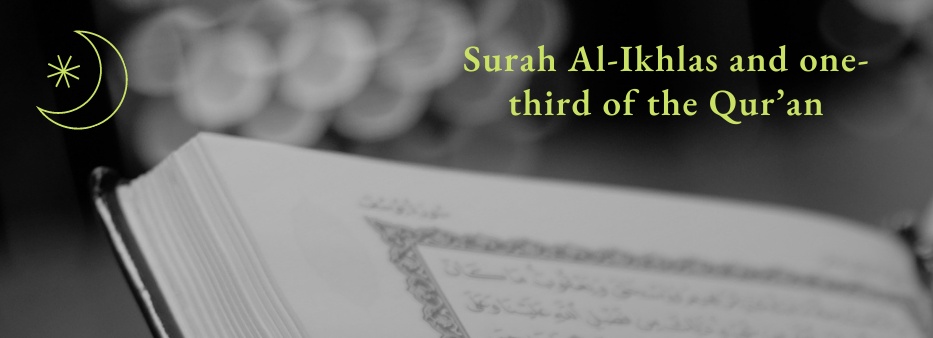Surah Al-Ikhlas was revealed in Makkah Al-Mukarramah. It includes the monotheism of Allah, which is the basis of Islam and one of the three pillars of Islam.
Surah Al-Ikhlas equals a third of the Quran, as it was proven in the authentic hadith:
He reported Allah’s Messenger as saying, “Is any of your incapable of reciting a third of the Qur’an in a night?” On being asked how they could recite a third of the Qur’ān he replied. “‘Say, He is Allah, one (Qur’an, 112) is equivalent to a third of the Qur’ān.”
So, it was well-known in the words of the predecessors: that the Holy Qur’an, which was revealed to the Prophet (peace and blessings be upon Him) is divided into three sections: a third of them are rulings, a third of them are promises and threats, and a third of them are names and attributes.
- This surah collected the names and attributes of the Lord. The surah included a statement of Allah’s holy Essence and the great attributes that no one can share with Him.
Take quran course only 3$ per class
- Everything that Allah described Himself with in this Surah, between affirmation and negation, are attributes specific to Him because His Essence is not similar to anything and His attributes are specific to Him, so they are not similar to any of the attributes. Rather, He, Glory be to Him, is One, who is eternal, “He neither begets nor is born”.
- His name (Al-Ahad) indicates the negation of participation and similarity, and His name (Al-Samad) indicates that He is worthy of all the attributes of perfection.

The meaning of “Samad”:
He is perfect in His attributes that all His creatures lacked. The second: is that there is nothing like him in the attributes of perfection fixed to him, and this is the meaning of his name (Al-Ahad).
Based on this, Surah Al-Ikhlas included everything that must be denied about Allah Almighty, and it also included all that must be affirmed for Allah Almighty regarding the attributes of perfection and beauty.
Surah Al-Ikhlas Translation & Tafseer Learn Surah Al Ikhlas with Tajweed Rules
-Reciting Surah Al-Ikhlas prevents evil
It was narrated that ‘Uqbah bin ‘Amir Al-Juhani said:
“While I was leading the Messenger of Allah [peace and blessings be upon Him] on his mount on a military campaign, he said: ‘O ‘Uqbah, say!’ I listened, then he said: ‘O ‘Uqbah, say!’ I listened, then he said it a third time. I said:
‘What should I say?’ He said: ‘Say: He is Allah, (the) One…’ and he recited the Surah to the end.
Then he recited: ‘Say: I seek refuge with (Allah) the Lord of the daybreak…’
And I recited it with him until the end. Then he recited: ‘Say: I seek refuge with (Allah) the Lord of mankind…’ and I recited it with him until the end. Then he said: ‘No one ever sought refuge (with Allah Almighty) by means of anything like them.'”(Sunan an-Nasa’I, Hasan Hadith)
Finally:
Muslims should do what they recite in the Holy Qur’an to achieve the essential aim which is contemplation and reflection on verses of the Qur’an and then do to be from the righteousness people, and then the Qur’an will intercede for a man.
Get Trial Class















Comments